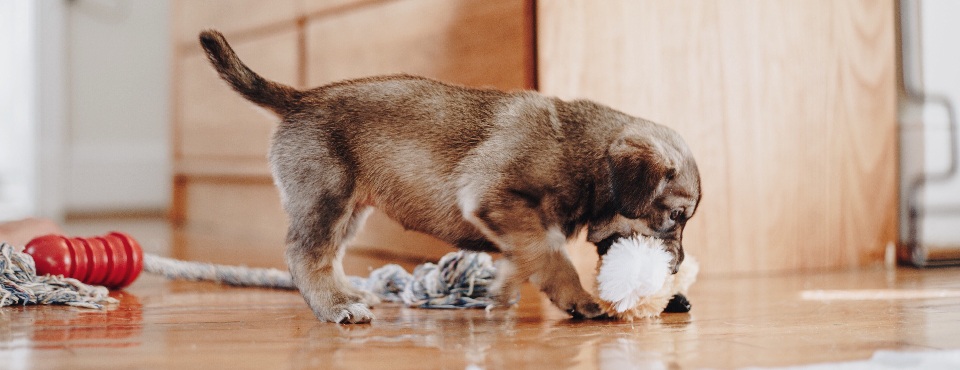
7 Questions To Consider When You Want To Buy A Dog
CARE & NUTRITION
20 Jan, 2020
READ 8 minutes
We don’t know how to break it to you, but if you want to buy a dog, you’re not buying a dog, per se. This living, breathing, being is a family member, a friend, a confidante, an unconditional love bug, a cuddle buddy, and a companion for life. The moment you meet your dog, you will fall head over heels. Your heart will overrule your head, especially if your dog is an adorable little puppy, and you may even run the risk of not thinking clearly for a day or two. For this reason, it’s incredibly important to thoroughly think through this life-enriching decision before you meet your mutt. After all, you’ll want to give your dog the best life possible. You need to be sure that you’re ready, willing, and able to provide for a dog. Here are seven questions to consider before you even start looking for your forever friend.

1. WHY DO YOU WANT A DOG?
Have you spent your whole life with a dog by your side? Are you seeking companionship? Protection? A travel mate? A soothing presence? Or are you interested in buying a dog for someone else in your house, like a child? Whether you are on your own or in a family, dogs become family the minute they enter your world. Knowing why you want a dog is the first step to being able to commit to welcoming a dog into your life. If you’re buying a dog for your partner, it’s best to review all of these questions together. If you’re buying a dog for a child, it’s best to assume that you will be the primary caretaker for the dog. Having reasonable expectations, your commitment to the dog, as well as your care of the dog, is the key to forming a great relationship with your furry friend. Dogs are pack animals. The leader of the home will typically be the leader of the pack, and this tends to be the person who is ultimately in charge of the dog’s health and wellbeing. It’s good to understand and accept that responsibility upfront.
2. DO YOU HAVE ENOUGH MONEY TO CARE FOR A DOG PROPERLY?
Aside from the investment needed to purchase or adopt a dog, consider the financial implications of basic care. If you’re interested in a puppy, you need to be able to afford the essential puppy vet visits. Puppies need a series of vaccinations, some of which are required by law in certain areas, to lead healthy lives. If you’re rescuing a dog with an unknown history, vaccinations are a must, and yearly boosters are required. Adult dogs need ongoing care, as well. Annual vet visits are critical. Veterinarians can help you understand your dog’s physical and mental health. They are also able to help you protect your pet from the spread of serious diseases by offering the latest information and treatment in things like flea and tick prevention. You need to expect the unexpected, too, like medical care. Pet insurance can help ease the burden of life’s many medical surprises, but you need to be sure that you can care for a dog through thick and thin. You’ll also need to invest in nutritious food and living supplies (beds, bowls, leashes, grooming supplies, treats, and toys). Certain breeds, like long-haired dogs, require expert grooming, while short-haired breeds often do not. You may even need to invest in things like training, dog walking, especially if your dog will be home alone for long periods during the day, or doggy daycare, and boarding.
3. DO YOU HAVE ENOUGH SPACE FOR A DOG?
Dogs need space, indoors and out. If you’re living in an apartment, you need to consider how much space your furry friend will need, along with where you will walk and play with your dog outside of the building. This question is dependent upon the type of breed you’re interested in. Believe it or not, some huge dogs, like Great Danes, can comfortably live in an apartment because they are less active than other breeds. Some small energetic breeds, like Border Terriers, might drive you batty in an apartment because they love to run and hunt. That type of dog would be better suited to a home, especially one with a yard. If you are in a home, do you have a yard with a fence? You don’t need a yard with a fence, but it certainly makes life easier for you and your dog. If you are renting your apartment or home, are you allowed to have a dog? Many leases have clear restrictions regarding pets.
4. DO YOU HAVE ENOUGH TIME TO CARE FOR A DOG?
One thing is for sure, you’ll want to spend a boatload of free time with your dog, but your dog has daily needs that are required, too. Your dog is going to be dependent upon you for everything: food, bathroom breaks, and exercise, along with training, cuddle time, and fun. You’ll need to offer those things to your dog every single day. Will you be able to provide your dog with a bathroom break during the day? Can you walk your dog before work or at the end of the day? If you work long hours or travel often, who will care for your dog in your absence? If you live with other family members, it’s easy for everyone to pitch in and care for your dog, but if you live alone, you’ll need a plan in place to be sure that your dog’s needs are fulfilled when you are unavailable.
5. WHAT SORT OF LIFESTYLE WILL YOU OFFER YOUR DOG?
Once you know that you have enough money, space, and time for a dog, it’s time to start thinking about your lifestyle and how your dog can comfortably fit into it. Are you an avid outdoorsy person or a quiet homebody? Do you live by the water or in a high-rise apartment? There are so many different breeds of dogs. The Fédération Cynologique Internationale (FCI) holds a registry of 339 different types of dogs. With just a little bit of thought and research, you can easily find a breed that will match your lifestyle. For instance, if you’re hoping for a lap dog, you’ll probably want to focus on a small breed. Alternatively, if your whole family loves to hike and camp, you may want to focus on a larger breed. Take the time to thoroughly research different dog breeds before even talking with a breeder or stepping into a shelter. Again: you’re destined to fall in love. It’s best to fall in love with a dog who shares your lifestyle and interests.
6. ARE THERE ANY HEALTH RESTRICTIONS THAT YOU NEED TO CONSIDER?
It’s essential to consider your health and wellbeing, and your family’s, before bringing a dog into your home. Are you, or is anyone in your family, allergic to dogs? The last thing you want to do is invite a furry friend in only to discover that you or someone you love has a severe allergic reaction to your new furry friend. This would be devastating for everyone, your dog included. Are there other physical limitations to consider? Remember, your dog is going to need regular exercise to stay healthy and fit, so whether you’re playing fetch in a yard or enjoying long walks, there needs to be a way to provide a solid foundation for your dog to thrive. Now, consider the health restrictions of the dog. When you research different types of dog breeds, place close attention to the health risk factors of each breed that you like. If you invest in a breed that is prone to diabetes, are you willing to do what it takes to help a diabetic dog live a happy, healthy life?

7. WHAT EXPECTATIONS DO YOU HAVE OF YOUR NEW FOREVER FRIEND?
You can expect unconditional love, along with great joy from your fur friend. You can also expect endless laughs, with a side of frustration from time to time. Dogs are animals. They speak a language very different from yours, but with a little time and attention, you can learn their language and even begin to speak it yourself. Dogs are fascinating creatures with a strong sense of emotional intelligence. It won’t be long before you notice that your dog can read your mood and lighten it. You might also see that your dog can make things disappear from time to time, like slippers, food, and papers. The best thing to expect is that you’ll need to invest your time and talent, helping your dog feel at home and find its place in your pack. Finally, you can expect to grow and flourish because dogs have a way of showing you how to enjoy life, one day at a time.
RECOMMENDED




